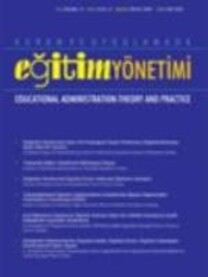Bilişötesi ve Yapılandırmacı Öğrenme Çevreleri
Bu çalışmada, öncelikle bilişötesi kavramı ve bileşenleri kuramsal bağlamda ele alınmış; daha sonra bireylere üst düzey düşünme ve öğrenen özelliklerini kazandırmada, anlamlı öğrenmenin oluşmasında, akademik başarının artmasında, problem çözmede, yansıtıcı düşünmede, öğrenmede sorumluluk almada, bireylerin bilişsel kaynaklarını işe koşmasını sağlamada bilişötesinin önemine değinilmiştir. Son olarak bilişötesini geliştirmede izlenen yaklaşımlar üzerinde durulmuş; ancak son yıllarda bilişötesinin geliştirilmesinde öne çıkan sosyal ortamlar aracılığıyla öğrenme yaklaşımına ağırlık verilmiştir. Bu bağlamda, yapılandırmacı öğrenme yaklaşımında bilişötesinin önemine ve bilişötesinin gelişimine katkı getiren yapılandırmacı öğretimsel uygulamalara değinilmiştir.
___
Applefıeld, J. M.; Huber, R. ve Moaellem, M. (2001). Constructivism in theory and practice: Toward a better understanding. The High School Journal, 84(2), 35-53.Cardelle-Elawar, M. (1992). Effects of teaching metacognitive skills to students with low mathematics ability. Teaching and Teacher Education, 8, 109-121.
Cotten, K. (1997). Teaching thinking skills. School improvement program: School improvement research series (SIRS). Northwest Regional Educational Laboratory, http://nwrel.Org/scpd/sirs/4/snapl3.html
Crowther, D. T. (1997). Constructivism. Electronic Journal of Science Education, 2 (2), http://www.unr.edu/homepage/jcannon/ejse/ ejsev2en2ed.html
Çetinkaya, P. (2000). Metacognition: It's assesment and relationship with reading comprhension, achievement and aptitude for sixth grade students. Yayımlanmamış Yüksek Lisans Tezi. Boğaziçi Üniversitesi, İstanbul.
Deseote, A., Roeyers H. ve Buysse, A. (2001). Metacognition and mathematical problem solving in grade 3. Journal of Learning Disabilities, 34(5), 435-449.
Driscoll, M. P. (2000). Psychology of learning for instruction. Boston: Allyn & Bacon.
Dunlop, J. C. ve Grabİnger, R. S. (1996). Rich environment for the active learning in the higher education. In B. G. Wilson (Ed.), Constructing learning environments: Case studies in instructional design (pp.: 65-82). Englewood Cliffs, NJ: Educational Technology Publications.
Eggen, P. ve Kauchak, D. (2001). Educational psychology. (5th ed.) New Jersey: Merrill Prentice Hall.
El-Hindi, A. E. (1996). Enhancing metacognitive awerenness of college learners. Reading Horizons, 36,214-230.
Flavell, J. H. (1993). Cognitive development. (3rd ed.) Englewood Cliffs, NJ: Simon & Schuster.
Flavell, J. H. (1979). Metacognition and cognitive monitoring. American Psychologist, 34, 906-911.
Gagne, R. M. ve Medsker, K. L. (1996). The conditions of learning -training applications-. USA: Harcourt Brace College Publications & Company.
Hamlin, T. M. (2001). Effects of learning style strategies and metacognition on adults' achievement. (Ed.D.). St. John's University (New York), School of Education and Human Services. Accession Number: AAI 3023376, Dissertation Abstracts Internationa, 62(08), A2655.
Hebert, E. A. (2000). Lessons learned about student portfolios. In K. M. Cauley, F. Linder, J. H. McMillan (Eds.), Educational psychology (pp.: 218-220). Dushkin: McGraw Hill.
Honebein, P. C. (1996). Seven goals for the design of constructivist learning environments. In B. G. Wilson (Ed.), Constructing learning environments: Case studies in instructional design (pp.: 11-24). Englewood Cliffs, NJ: Educational Technology Publications.
Jonassen, D. H. (1997). Instructional design models for well-structured and ill-structured problem-solving learning outcomes. Educational Technology Research and Development, 45(1), 65-94.
Kuiper, R. (2002). Enhancing metacognition throught the reflective use of self- regulated learning strategies. The Journal of Continuing Education in Nursing, 33(2), 78-87.
Küçük-Özcan, Z. Ç. (2000). Teaching metacognitive strategies to 6th grade students. Yayımlanmamış Yüksek Lisans Tezi. Boğaziçi Üniversitesi, İstanbul.
Lebow, D. (1993). Constructivist values for instructional systems design: Five principles toward a new mindset. Educational Technology Research and Development, 41(3), 4-16.
Lin, X. (2001). Designing metacognitive activities. Educational Technology Research and Development, 49(2), 23-40.
Livingston J. A. (1997) Metacognition: An overview, http://www.gse.buffalo.edu/fas/schuell/cep564/Metacog.htm. (İndirme Tarihi: 10.01.2004).
Mevarech, Z. R. (1999). Effects of metacognitive training embedded in cooperative settings on mathematical problem solving. The Journal of Educational Research, 92(4), 195-205.
Murphy, E. (1997). Constructivism, http://www.stemnet.nf.ca/elmurphy/ emurphy/constructivism.htm.
O'neil, H. F. Jr. ve Abedi, J. (1996). Reliability and validity of a state metacognitive inventory: Potential for alternative assessment. The Journal of Educational Research, 89,234-245.
Santrock, J. W. (2001). Educational psychology. (International Edition) New York: McGraw-Hill Companies, Inc.
Savery, J. R. ve Duffy, T. M. (1996). Problem based learning: A instructional model and its constructivist framework. In B. G. Wilson (Ed.), Constructing learning environments: Case studies in instructional design (pp.: 135-148). Englewood Cliffs, NJ: Educational Technology Publications.
Schraw, G. ve Graham, T. (1997). Helping giffted students develop metacognitive awerenness. Roeper Review, 20,4-8.
Senemoğlu, N. (1997). Gelişim öğrenme ve öğretim. Ankara: Ertem Matbaacılık.
Sikorsky, F. D. (1993). Instructional strategies for children's development of metacognitive control for learning. (Ed.D.). Hofstra University. Accession Number: AAI 9320277, Dissertation Abstracts International. 54(03), A0877.
Slavin, R. E. (1996). Research on cooperative learning and achievement: What we know, what we need to know? Contemporary Educational Psychology, 21,43-69.
Steinberg, N. R. (1991). Cognitive and metacognitive knowlwdge about writing of kindergarten children in a whole language environment. (Ph.D.). Fordham University. Accession Number: AAI 9136338, Dissertation Abstracts International, 52(07), A2397.
Stellwagen, J. B. (1997). Phase two: Using student learning profiles to develop cognitive self-assessment skills. American Secondary Education, 26,1-8.
Sternberg, R. J. ve Williams, W. M. (2002). Educational psychology. Boston: Allyn& Bacon.
Ülgen, G. (1997). Eğitim psikolojisi. Ankara: Alkım Yayınevi.
Ülgen, G. (2001). Kavram geliştirme: Kuramlar ve uygulamalar (3. Baskı) Ankara: Pegem-A Yayıncılık.
Williamson, R. A. (1996). Self-questioning: An aid to metacognition. Reading Horizons, 37,30-47.
Wittrock, M. C. (1986). Students' Thought Processes. In M. C. Wittrock (Ed.), Handbook of research on teaching (3rd Ed.). New York: Macmillan.
Yurdakul, B. (2004). Yapılandırmacı öğrenme yaklaşımının öğrenenlerin problem çözme becerilerine, bilişötesi farkındalık ve derse yönelik tutum düzeylerine etkisi ile öğrenme sürecine katkıları. Yayımlanmamış Doktora Tezi. Hacettepe Üniversitesi, Ankara.
- ISSN: 1300-4832
- Yayın Aralığı: Yılda 4 Sayı
- Başlangıç: 1995
- Yayıncı: Pegem Akademi Yayıncılık Eğitim Danışmanlık Hizmetleri Tic. Ltd. Şti.
Sayıdaki Diğer Makaleler
İlköğretim Okulu Öğrencileri Okullarında Hangi Durumları Problem Olarak Algılamaktadır?
Küreselleşme ve Lizbon Eğitim 2010 Hedefleri
Öğretmenliğe İlişkin Tutumların Özgecilik ve Atılganlık Düzeyleri Açısından İncelenmesi
A. Esra İŞMEN, S. Armağan YILDIZ
Nilüfer ÖZABACI, Bahaddin ACAT
Bilişötesi ve Yapılandırmacı Öğrenme Çevreleri
Tezsiz Yüksek Lisans Öğretmen Adaylarının Öğretmenlik Yeterlikleri Üzerine Değerlendirmeleri
